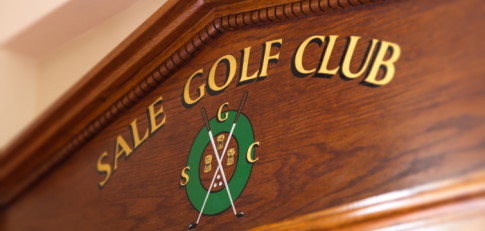Competitions Committee Weekly Newsletter - September 25th
Saturday Competition – 27th September:
The Millenium Bowl
This is an 18 hole bogey event. Entry fee is £3. White tees.
Last Year’s Winner: John Jones 5 UP.
The BOGEY format is a form of match play between the player and the golf course. The golf course always scores par at each hole and the player, after allowing for handicap, must try and equal or better par. If you better par then you win the hole; if you equal par then you halve the hole; if you get worse than par, you lose the hole.
Results:
Sir William Proctor Smith Golden Jubilee Plate
Congratulations to Steve Price on winning the Golden Jubilee Plate with scores of: 72, 71, 69, 69, 67, 66 = 414
Mike Bishop came second with scores of: 72, 71, 70, 70, 67, 65 = 415
John Russell wins the gross prize with scores of = 71, 71, 71, 70, 69, 68 = 420
The prizes will be presented at the Men’s Annual Dinner in November.
The final positions have been published on the noticeboards and HowDidiDo.
The Thwaites Bowl
Congratulations to James Ball on winning the Thwaites Bowl. Having birdied the 9th hole to go out in 38 gross, James cruised to victory by 3 shots, with a score of 79-17-62.
Of the 169 entries, there were 21 no returns. The 6th hole played just as difficult as the 12th hole, averaging 5.6.
For the first time this year, there were no birdies on the 15th hole, even though the flag was in the centre of the green.
When compared against their respective stroke indexes, the 14th hole played the hardest and the 18th hole the easiest.
Club Finals Day Results
President’s Prize: Kevin Roberts beat Paul Abbott
Club Foursomes: John Russell & Steve Snape beat Andy Daley & Mike Bishop
Four-ball Knockout: Ian & Jack Bullough beat Mobi Rawthore & Neil Griffiths
Howie Trophy Mixed Foursomes: Mobi & Cath Rawthore beat Sam Poole & Caroline Glain
Junior Singles: Callum Perry beat Josh Wilding
Ladies Singles: Gill Ross beat Cynthia Hammond
Ladies Foursomes: Cathy Hartland & Linda Swindell beat Cath Rawthore & Ella Rawthore
The Club Championship Final: John Russell versus Mark Marshall - to be played on Sunday 28th September at 9:20am.
5/6 Day Members Singles Final: Mike George versus Anthony Rains - date yet to be agreed.
Other Information:
This month’s prize presentation will take place on Friday 3rd October at 7:30pm.
Archie Preston Mixed Foursomes Semi-Final v Blackburn: Sale won 4-3. The final takes place at Blackburn Golf Club on Sunday 28th September at 8:30am.
City Glass Alliance Foursomes Semi-Final v Worsley: Sale won 5-2. The final takes place at Northenden Golf Club on Sunday 5th October at 8:30am.
Both these teams need your support so please come and cheer them on.
Handicaps:
This is the third of a number Q&A articles with our Handicap Committee - Chris Leonard and Dave Parsons.
Q: So far we’ve discussed how handicaps go UP. Now can you please explain how handicaps come DOWN?
A: First, a golfer can reduce his handicap by returning a nett qualifying score that is BELOW the Competition Standard Scratch (CSS) in a Handicap Qualifying competition.
Q: Is the nett qualifying score his score after any nett double bogey adjustments?
A: Yes, it’s the score AFTER any nett double bogey adjustments and only relevant for handicap calculation purposes.
The handicap reduction is calculated using the nett qualifying score and our friend the nett differential.
If you remember the last article, the nett differential is the score (+ OR -) relative to CSS after the score on each hole has been limited to nett double bogey (which you now know is called the nett qualifying score).
Q: Can you refresh our memory by giving another example of a nett differential calculation?
A: Let’s say our 14 handicapper shoots 80 gross, nett 66. Playing conditions were normal and CSS was 70. Our golfer played consistently but scored a quadruple bogey 7 on the 17th hole (stroke index 13) where he receives a stroke.
His actual nett score for the competition would be 66 but his nett qualifying score for handicap purposes would be 65 because of the nett double bogey adjustment on the 17th hole, where his score of 7 is reduced to 6.
His nett qualifying score of 65 means that his nett differential would be -5, i.e. 65 minus 70 (CSS).
Q: So how do you calculate his handicap adjustment?
A: If a player returns a nett differential of less than zero, then his EXACT handicap is reduced by an amount per stroke that the nett differential is below zero. The reduction amount per stroke is determined by his Handicap Category.
Category One the amount per stroke is 0.1.
Category Two the amount per stroke is 0.2.
Category Three the amount per stroke is 0.3.
Category Four the amount per stroke is 0.4.
So a nett differential of -3 would reduce a Category One golfer’s exact handicap by 0.3.
A nett differential of -4 would reduce a Category Two golfer’s exact handicap by 0.8.
A nett differential of -5 would reduce a Category Three golfer’s exact handicap by 1.5.
A nett differential of -6 would reduce a Category Four golfer’s exact handicap by 2.4.
Q: What happens when a golfer’s handicap is reduced and goes from a higher Category to a lower Category?
A: It is reduced at the rate appropriate to the higher Category only so far as brings his exact handicap into the lower Category and the balance of the reduction is then the rate appropriate to the lower Category
For example, if a golfer with an exact handicap of 21.2 (Category Four) returns a score with a nett differential of -6, his exact handicap is reduced in two parts as follows: 21.2 minus (2 x 0.4) = 20.4, then (as he is now in Category Three) 20.4 minus (4 x 0.3) = 19.2
Q: Why, when a golfer shoots a really low score, do you not slash their handicap? If someone shoots gross 85 playing off 24 in a summer medal, why don’t you reduce their handicap to say 18? They are clearly capable of playing off 18, aren’t they?
A: This brings us to the second way a handicap can be reduced. In answer to your question, CONGU are strongly against such action. They say that discretionary cuts tend to be very distorting. Having reviewed the situation, four Golf Unions have introduced, on a trial basis, what is called an exceptional score adjustment process.
This process does not apply to Handicap Category One golfers i.e. those with handicaps of 5.4 and less, but a golfer scoring 85 gross 61 nett, in a Handicap Qualifying competition, would trigger the exceptional score adjustment process.
Q: Have any exceptional score adjustments been applied to Sale members this season and how does the process work?
A: Yes, it has been applied. However, as the adjustment process is a little bit complicated, we will explain how it works next week. We will be using a real case scenario because our Captain’s performance this season provides a perfect example of how the adjustment process works.
06/10/2014
© Sale Golf Club







